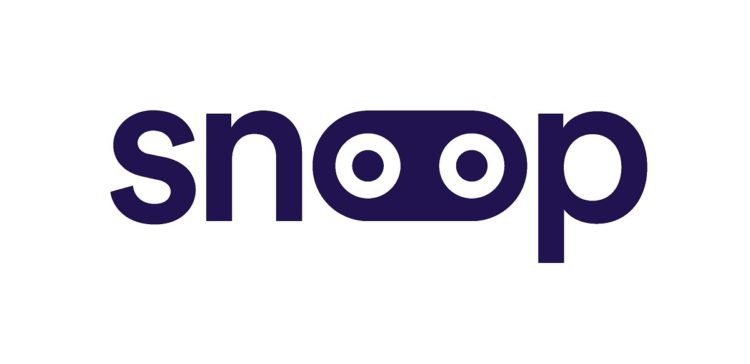What if your bank analysed your transactions and offered you tips on how you could save money?
It’s not a bank, but fintech Snoop is embracing the power of open banking to offer just such a service, says Paul Lloyd, CMO and co-founder.
Available as a mobile app for Android and iPhone, Snoop allows customers to connect their bank accounts and credit card. With the customer’s permission, AI models then analyse their transactions to determine whether they are paying more for services such as energy, mobile and broadband. If a customer often shops at John Lewis, they can be notified when a sale is on.
The service is free to users, aiming to save the average household £1500 per year. Snoop makes its money by taking a commission when the customer is referred to a cheaper service.
Snoop arose from a group of Virgin Money alumni, including Paul himself, who was head of marketing for Virgin One, a product that allowed customers to manage all of their finances in one place.
After Paul and his team left Virgin Money in 2018 due to the , Snoop arose from the team being “quite hard on themselves” about whether they had achieved their ambitions to make people better off. Snoop came from the idea of building a business that wasn’t a bank and “didn’t have to be dependent on selling its own product”.
“One business is never best for the customer, so could we act as a guardian angel for the consumer?”
Paul says working for a digital business is “the most public thing [he’s] ever done”.
“You have a rating in the app store, a position in the chart and comments from customers, a Trustpilot score.
“It’s so visible and acute, it’s all about walking the walk and genuinely demonstrating we’re on the side of the customer.”
While disruptive entrants to existing sectors often benefit from customers already recognising their product, for Snoop, part of the mission is clearly explaining what the business does.
“When I talk to a business audience I say think of us as a business that sits between banks and consumers and does it better, just as Airbnb does with accommodation.
“When talking to consumers, I say think of it like an Instagram for your money: a feed of stuff all based on ideas that can help you.”
One technique has been to embody the brand in a personality – in Snoop’s case, a robot called Robot Hood who is “fighting your corner and always looking for smart ways to save you a king’s ransom.”
Paul says the company uses a wide range of channels to get its message across, whether digital such as Facebook or Instagram or more traditional such as radio.
“I love radio because in my view it’s the most effective way of reaching a mass of consumers in an efficient way. We’re a start-up so we don’t have TV budgets – so how do you get yourself to a place where consumers are aware of you and try you?”

With this campaign, the challenge was to “take a robot that doesn’t speak and make a radio ad”. In the end, Snoop licensed the Robin Hood song and ran the campaign nationally.
“[External marketing] is a lot about getting customers to try the product. The brilliant thing about it being free is people can try it.”
The primary brand building exercise is via the user experience, Paul says.
“Most financial services businesses care a lot about acquiring and onboarding customers and don’t worry about them until two years down the line. Here we worry about them every single day.
“Ultimately, you can tell as good a brand story as you like but your product and your experience is everything.”
Snoop’s marketing ethos places a significant emphasis on customer retention; Paul says some of his favourite campaigns at Snoop have focused on existing customers.
One campaign saw Snoop compiling a piece of insight showing how much more each customer would have to pay as prices rose in April, which looked at what services customers had to deliver them a personalised estimate.
Another customer-focused campaign came from a customer complaining about a cashback business where they paid a monthly fee.
“We can see how much you’re paying to it and how much you’re earning from it – very few people were making their money back.
“We told every customer that had this service whether they were making money.”
Other examples included Tesco having a problem with duplicate transactions and water companies charging customers for drainage, the latter of which allowed a customer to work out a whole estate shouldn’t be paying drainage and reclaim £45,000.
To Paul, these communications demonstrate the value of the service, while generating great PR.
“Why is no bank doing this?” Paul asks, adding that he sees Snoop as “sit[ting] between the bank and the consumer and frankly doing a better job.”
Since “the customer can delete you in a heartbeat”, Paul says digital app-based businesses fundamentally need to “care more about the customers you have than those you’re trying to acquire.”
The company has recently completed a Series A fund raise which will allow it to pursue its roadmap for the next two years: specifically, scaling rapidly, developing product and distribution and expanding internationally.
“You’d expect me to say it but we’re really proud of the business we’ve built.
“I think we’re a genuinely helpful service which really makes a difference to people’s lives. The exciting bit is about can we take that to the mainstream? Why can we not make banking apps obsolete – because that’s the opportunity. Can we be useful enough to enough people to achieve that ubiquity?”
“We’ve got the platform, all we need to do is make Snoop smarter and more useful.”

